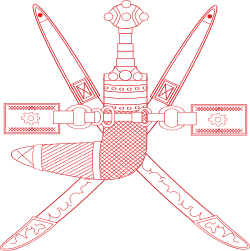 |
|---|
|
| Cabinet |
The deputy prime minister of Oman is a political position in the Cabinet of Oman. The deputy prime minister is the second highest ranking title in the executive branch of the Government of Oman after the Sultan. The main role of the deputy prime minister is to chair the cabinet meeting in the absence of the Sultan. The deputy prime minister is appointed by the Sultan. Traditionally, Sultans have appointed several deputy prime ministers serving concurrently.